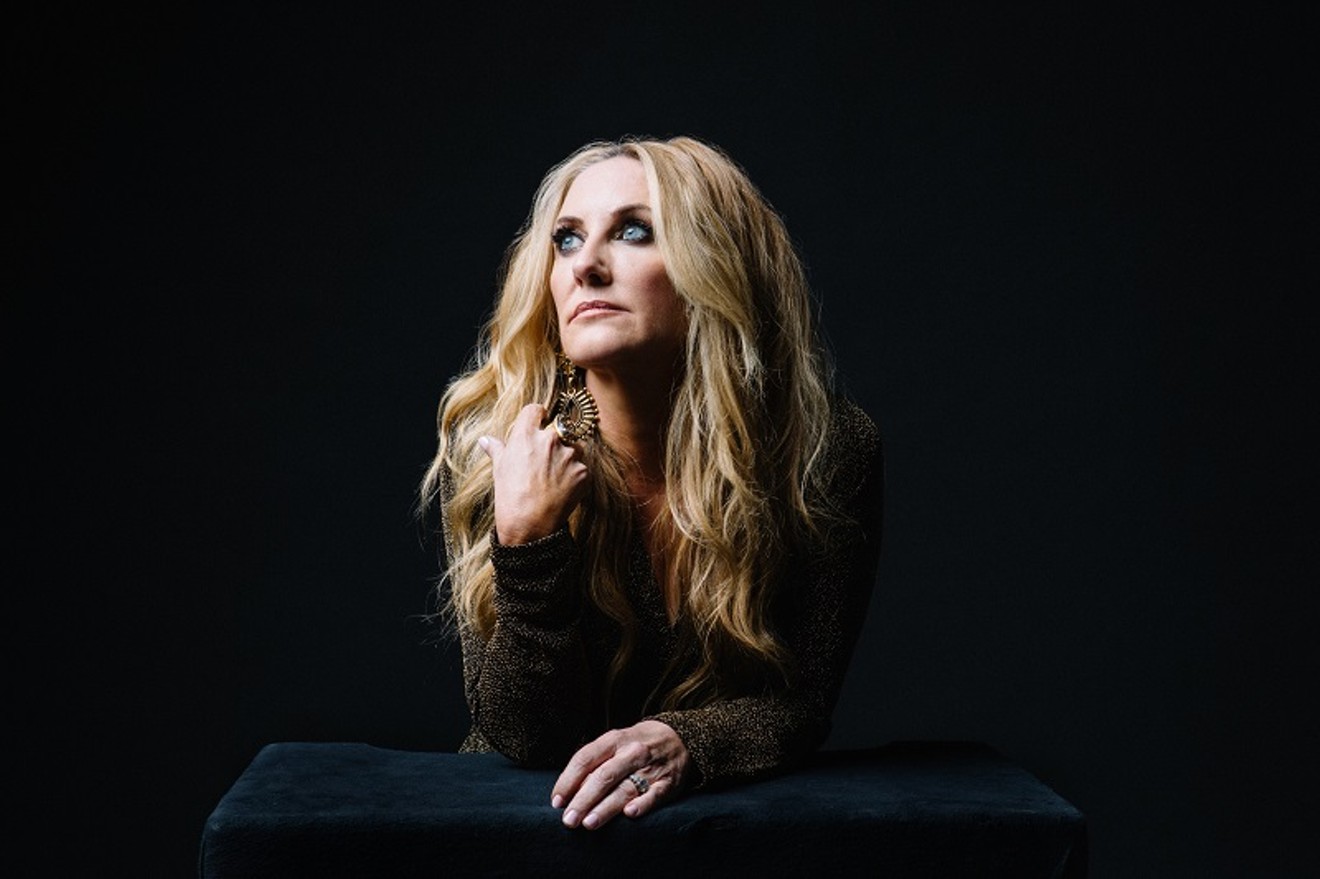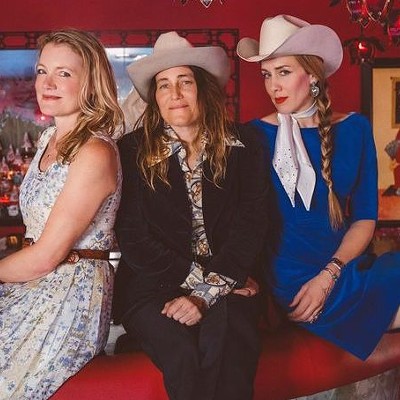After earning multi-platinum success for a country-pop crossover in the 1990s, Lee Ann Womack has charted a decidedly different course in recent years. Eschewing her former glossy, pop-country success for a rugged, often dark classic country sound, Womack will blaze a brand new trail with her latest album The Lonely, The Lonesome, and the Gone, set for release on October 27.
According to Womack, much of the darkness on her new album comes directly from her upbringing in East Texas, with its thick covering of pine trees and rich musical history. “When you think about East Texas, the areas around Caddo Lake and beyond, the history and the music that has come out of there has a sort of tragic or gothic feel to it. There’s just something in the dirt there,” Womack tells the Press. “From Lightnin’ Hopkins to Janis Joplin. And I think that’s why I have a lot of the emotions that I do. I’m not a downer or an Eeyore or anything, but those things speak to me.”
To further drive home that gloomy East Texas vibe, Womack recorded her debut album on ATO Records at Houston’s own legendary Sugar Hill Studios, which lends both a rich musical history and a unique culture, one that Womack couldn’t find in Nashville. “I had always cut most of my stuff in Nashville, and when you go to the studio, you’re running into all these other people in the business and they’re going on about charts and numbers,” she says. “And you just want to ask are y’all selling music, or are you selling widgets? At Sugar Hill, everyone’s there just to make music. Everyone’s smiling and happy. They’re not acting like they’re curing cancer, they’re acting like they’re making music.”
Womack also credits the room with making her latest record more sonically intimate. “I wanted people to listen and close their eyes and almost feel like they were in the room with me while I was laying this down,” she says. “Like they were getting inside the music. I didn’t want it to be slick and glossy, I didn’t want people to just hear it. I wanted people to feel it.” It also didn’t hurt that working there meant that Womack could go to sleep in her own bed in the house she owns in Houston after a long day of recording.
Womack insists that she’s always been making music like this, it’s just not what she’s most well-known for. “My very first single was a song called “Never Again Again” and it was darker. That’s just what I’m drawn to. Of course I’m known for “I Hope You Dance,” she says. “I didn’t do a lot of positive and uplifting stuff in my career but that’s what people relate me to. And that’s fine, because music can be healing, and that’s better than money or anything else. But I was the girl who was just a traditional country singer. It’s not that I feel down or dark or anything, I channel that. I feel it in other people. That’s just who I speak to and who I relate to.”
But for fans who have missed Womack’s evolution into her new role, it’s a bizarre juxtaposition, really. To hear Womack’s angelic voice against a stripped-down version of George Jones’ “Please Take The Devil Out Of Me” or “End of the End of the World” is a study in contrasts. Especially when you were first introduced to her as a curly-headed mama singing inspirational country-pop on the radio. On songs like “Mama Lost Her Smile,” it is precisely that sort of battle between light and darkness that makes a song about skewed memories and sadness even more of an emotional one-two punch. She’s telling the truth, connecting with authentic experiences, and in her mind, coming full circle.
Exactly at the same time as Womack has really come into her own as an artist whose work falls decidedly outside of country’s mainstream, the definition of what even fits into that tiny, homogeneous box of radio stars and Sam Hunt wannabes has changed dramatically. But now she’s finally at a label, ATO Records, that recognizes exactly what she’s trying to do, and embraces it. “I have been making records for 15 years and turning them into a label that asks what do I expect them to do with this really traditional music,” she says. “At ATO, I give them the record and they know exactly what to do with it.”
Home to Americana stalwarts like Brandi Carlisle, the Drive-By Truckers, and Hurray for the Riff Raff, ATO has extensive experience in getting artists who may not wind up on the radio in front of fans who are obsessively looking for the best new Americana. And that’s changed what Lee Ann Womack is. Formerly a pop-country chanteuse, she’s now something entirely different. Or at least, she’s considered something entirely different — the rising queen of Americana music.
But Womack insists that country music has changed, not her. “People ask me why I’ve switched away from country. I haven’t changed, what they call country music has changed,” she says. “I feel like it’s up to me to make the best music I can make and it’s up to the label to market it and put it exactly where it needs to be. I do finally feel like I have a good partner in ATO and people that I’m working with who not only understand what I’m doing, but appreciate it.”
And pretty much anyone who takes a single listen to The Lonely, The Lonesome, and the Gone can hear exactly why. It’s a stunning record, with striking songwriting, excellent vocals, and one hell of a dark undercurrent. It’s the music that Womack’s been trying to make her entire career, and it’s finally happening.
“I’m not rolling the rock back up the hill every day. For 15 years, every single day of my life felt like starting over at zero every time,” she says. “Now I’m just making music that I love and letting the chips fall where they may.”
Support Us
Houston's independent source of
local news and culture
account
- Welcome,
Insider - Login
- My Account
- My Newsletters
- Contribute
- Contact Us
- Sign out
East Texas Pines, SugarHill Studios Fuel Lee Ann Womack's Dark New Sound
Amy McCarthy October 16, 2017 5:00AM

Lee Ann Womack has come a long way from "I Hope You Dance."
Photo by Ebru Yudiz/Courtesy of ATO Records
[
{
"name": "Related Stories / Support Us Combo",
"component": "11591218",
"insertPoint": "4",
"requiredCountToDisplay": "4"
},{
"name": "Air - Billboard - Inline Content",
"component": "11591214",
"insertPoint": "2/3",
"requiredCountToDisplay": "7"
},{
"name": "R1 - Beta - Mobile Only",
"component": "12287027",
"insertPoint": "8",
"requiredCountToDisplay": "8"
},{
"name": "Air - MediumRectangle - Inline Content - Mobile Display Size 2",
"component": "11591215",
"insertPoint": "12",
"requiredCountToDisplay": "12"
},{
"name": "Air - MediumRectangle - Inline Content - Mobile Display Size 2",
"component": "11591215",
"insertPoint": "4th",
"startingPoint": "16",
"requiredCountToDisplay": "12"
}
,{
"name": "RevContent - In Article",
"component": "12527128",
"insertPoint": "3/5",
"requiredCountToDisplay": "5"
}
]
KEEP THE HOUSTON PRESS FREE...
Since we started the Houston Press, it has been defined as the free, independent voice of Houston, and we'd like to keep it that way. With local media under siege, it's more important than ever for us to rally support behind funding our local journalism. You can help by participating in our "I Support" program, allowing us to keep offering readers access to our incisive coverage of local news, food and culture with no paywalls.
Trending Music
- How Much Longer Can Classic Rock Rule the Roost?
- Top 10 Butt-Rock Bands of All Time
- Houston Concert Watch 4/24: Rolling Stones, Bad Bunny and More
-
Sponsored Content From: [%sponsoredBy%]
[%title%]

Don't Miss Out
SIGN UP for the latest
Music
news, free stuff and more!
Become a member to support the independent voice of Houston
and help keep the future of the Houston Press FREE
Use of this website constitutes acceptance of our
terms of use,
our cookies policy, and our
privacy policy
The Houston Press may earn a portion of sales from products & services purchased through links on our site from our
affiliate partners.
©2024
Houston Press, LP. All rights reserved.





